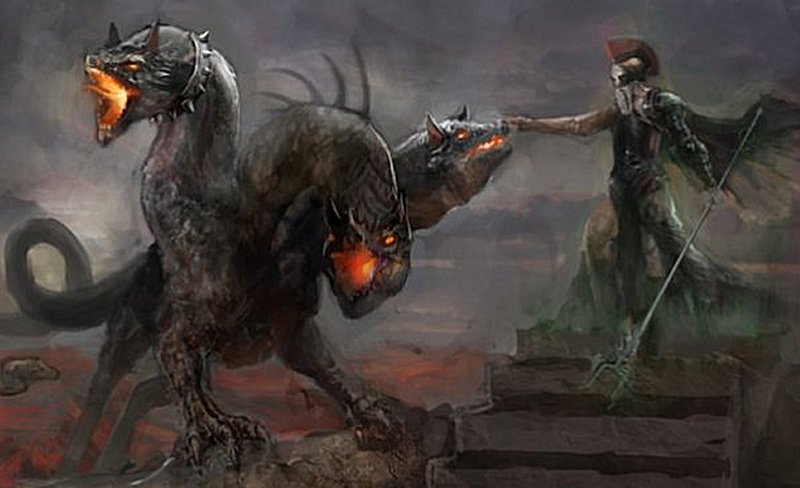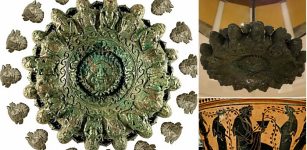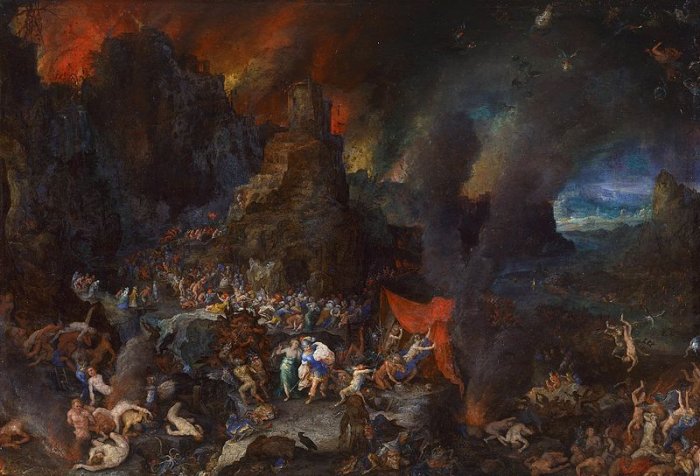Hades – Land Of The Dead In Greek Beliefs Offered Punishment And Paradise Full Of Harmony
A. Sutherland - AncientPages.com - In Greek mythology, there is a well-known myth of Hades, a harsh, shadowy place where the dead lived. Hades is also the name of the god who reigned over this inhospitable realm.
Hades does not resemble the Christian hell and cannot be compared to Irkalla, the ancient Mesopotamian underworld, or Mictlan in Aztec beliefs.
 Cerberus guarded the underworld, the realm of God Hades. Credit: Stock photo
Cerberus guarded the underworld, the realm of God Hades. Credit: Stock photo
The Greek realm of the dead is also very far from the reality of Diyu and its 18 levels of hell with awful chambers where people are tortured and constantly suffer pain.
The deceased entered Hades with the help of Charon, the ferryman and a psychopomp of Hades whose duty was to carry dead souls across the rivers Acheron and Styx that divided the world of the living from the world of the dead. It happened that also Hermes, the god, and a psychopomp, led the spirits of the dead to the afterlife; in Egyptian beliefs, this role had Anubis, the god of death, mummification, embalming, and the afterlife.
The underworld of Hades had five magical rivers. Each of them had its symbolic meaning: Phlegethon (fire), Lethe (oblivion), Acheron (the river of sorrow or grief), Cocytus (lamentation), and Styx (hate), the principal river in the underworld, which formed the boundary between the upper and lower worlds. The Greek gods swore upon the river Styx. Their oath was sacred, and if any deity was guilty of breaking it, he was deprived of divine drink (nectar) and ambrosia, which the gods traditionally consumed during their banquets.
The far side of the river was guarded by Cerberus, the three-headed dog, defeated by Heracles (Roman Hercules). Passing beyond Cerberus, the shades of the departed entered the land of the dead to be judged.
Then, the souls passed the entrance guarded by Cerberus, the three-headed dog was usually kind when the deceased had just arrived, but he became very aggressive when someone tried to get out.
Finally, they entered the realm of Hades and appeared before the judges (past kings and sons of Zeus) who passed verdicts on the dead. They weighed the mistakes and good deeds of souls, and the deceased was rewarded or cursed.
The painting depicts Aeneas' journey in the Underworld led by the Cumaean Sibyl (Aeneid VI, 269-282). Credit: Public Domain
If someone was once a brave hero or a good ruler, the judges sent them to the Elysian Fields (Elysium). In Greek beliefs, it was a part of Hades, destined for souls of good people who can enjoy feasts and celebrations, and can be compared to Valhalla in Norse mythology.
Those souls, who had committed serious crimes against the gods, would be sent to the Fields of Punishment, a part of Tartarus, where the dead, like a giant Tityos, Sisyphus, and Tantalus, were judged to spend eternity.
Zeus sent many of the Titans to Tartarus.
Asphodel Meadows was a peaceful and pleasant place in Hades for most souls who had not achieved any extraordinary deeds nor committed evil things.
Only a Few Mortals Could Leave Hades
Very few mortals could leave Hades once they entered, but as in all Greek mythology, there were exceptions to the rule. One example was Orpheus, a son of the Thracian river god Oiagros and the Muse Calliope. He was one of the few Greek heroes who visited the land of the dead and successfully returned to earth.
Hades had many residents, including also those who were not prisoners like, for example, Hekate, the goddess of magic, many evil spirits, and demons, including the Arai, the hearts of a curse, and the three Furies, goddesses of revenge and retribution, with appearance, which was both remarkable and hideous.
Hades, who ruled over his realm, did not like unwanted visitors; he played evil tricks on visitors from the land of the living, and trespassing on the land of the dead wasn’t welcomed.
Written by - A. Sutherland - AncientPages.com Senior Staff Writer
Updated on January 06, 2023
Copyright © AncientPages.com All rights reserved. This material may not be published, broadcast, rewritten or redistributed in whole or part without the express written permission of AncientPages.com
More From Ancient Pages
-
 Radar Reveals ‘Ghost’ Footprints From Pleistocene Era
Archaeology | Nov 13, 2019
Radar Reveals ‘Ghost’ Footprints From Pleistocene Era
Archaeology | Nov 13, 2019 -
 Fossilized Million-Year-Old Human Skull Of Yunxian Man Excavated In China
Archaeology | Jan 10, 2023
Fossilized Million-Year-Old Human Skull Of Yunxian Man Excavated In China
Archaeology | Jan 10, 2023 -
 U.S. Bible Museum Says Five Dead Sea Scrolls Fragments In Their Collection Are Fake
Archaeology | Oct 25, 2018
U.S. Bible Museum Says Five Dead Sea Scrolls Fragments In Their Collection Are Fake
Archaeology | Oct 25, 2018 -
 On This Day In History: Unua Libro ‘First Book’ Describing Esperanto Published – On July 26, 1887
News | Jul 26, 2016
On This Day In History: Unua Libro ‘First Book’ Describing Esperanto Published – On July 26, 1887
News | Jul 26, 2016 -
 Medieval Ship Discovered Off The West Coast Of Sweden May Have Been Attacked By Pirates
Archaeology | Feb 4, 2022
Medieval Ship Discovered Off The West Coast Of Sweden May Have Been Attacked By Pirates
Archaeology | Feb 4, 2022 -
 The Prophecy Of The Rainbow Warriors And Future Of Planet Earth
Featured Stories | Aug 29, 2018
The Prophecy Of The Rainbow Warriors And Future Of Planet Earth
Featured Stories | Aug 29, 2018 -
 What Can The 3D Reconstruction Of The Principia At Novae Reveal About Roman Propaganda?
News | Sep 16, 2023
What Can The 3D Reconstruction Of The Principia At Novae Reveal About Roman Propaganda?
News | Sep 16, 2023 -
 Medieval Manor Of Court De Wyck – Re-Discovered
Archaeology | Oct 10, 2023
Medieval Manor Of Court De Wyck – Re-Discovered
Archaeology | Oct 10, 2023 -
 Evidence Of Cosmic Catastrophe 12,800 Years Ago – Earth Collided With Fragments Of A Comet
Archaeology | Feb 2, 2018
Evidence Of Cosmic Catastrophe 12,800 Years Ago – Earth Collided With Fragments Of A Comet
Archaeology | Feb 2, 2018 -
 Evidence Of Legendary Ancient Great Flood In China May Re-Write History
Chinese Mythology | Aug 5, 2016
Evidence Of Legendary Ancient Great Flood In China May Re-Write History
Chinese Mythology | Aug 5, 2016 -
 What Did Houses For Ordinary People In Sumer Look Like?
Ancient History Facts | Jul 30, 2017
What Did Houses For Ordinary People In Sumer Look Like?
Ancient History Facts | Jul 30, 2017 -
 Was Spruce Hill In Ohio Home To An Ancient Lost Civilization? Traces Of Strong Fire Puzzle Scientists
Featured Stories | Jan 17, 2018
Was Spruce Hill In Ohio Home To An Ancient Lost Civilization? Traces Of Strong Fire Puzzle Scientists
Featured Stories | Jan 17, 2018 -
 Mysterious Biblical Celestial City And Its Connection To The North Star – The Arrival – Part 2
Biblical Mysteries | Feb 26, 2021
Mysterious Biblical Celestial City And Its Connection To The North Star – The Arrival – Part 2
Biblical Mysteries | Feb 26, 2021 -
 7,000-Year-Old Underwater Road Discovered In Adriatic Sea Off Korcula Island
Archaeology | May 11, 2023
7,000-Year-Old Underwater Road Discovered In Adriatic Sea Off Korcula Island
Archaeology | May 11, 2023 -
 Sophisticated Masonry In Anasazi Dwelling Ruins At Mesa Verde National Park, Colorado, USA
Civilizations | Aug 11, 2015
Sophisticated Masonry In Anasazi Dwelling Ruins At Mesa Verde National Park, Colorado, USA
Civilizations | Aug 11, 2015 -
 New Egyptian Dinosaur Helps To Reconstruct Evolution Of Dinosaurs In Africa
Archaeology | Jan 30, 2018
New Egyptian Dinosaur Helps To Reconstruct Evolution Of Dinosaurs In Africa
Archaeology | Jan 30, 2018 -
 An Ancient Woman’s DNA From A 20,000-Year-Old Pendant – Recovered By Researchers
Archaeology | May 4, 2023
An Ancient Woman’s DNA From A 20,000-Year-Old Pendant – Recovered By Researchers
Archaeology | May 4, 2023 -
 Etruscan Beautiful Bronze Lamp of Cortona – Studied
Artifacts | Apr 10, 2024
Etruscan Beautiful Bronze Lamp of Cortona – Studied
Artifacts | Apr 10, 2024 -
 Emerald Mound In The Ancient City Of Natchez: Second Largest Temple Mound In North America
Featured Stories | Feb 22, 2018
Emerald Mound In The Ancient City Of Natchez: Second Largest Temple Mound In North America
Featured Stories | Feb 22, 2018 -
 Australia’s First Marine Aboriginal Archaeological Site Questioned
Archaeology | Jun 22, 2022
Australia’s First Marine Aboriginal Archaeological Site Questioned
Archaeology | Jun 22, 2022

